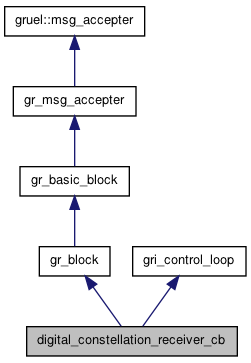This block takes care of receiving generic modulated signals through phase, frequency, and symbol synchronization.This block takes care of receiving generic modulated signals through phase, frequency, and symbol synchronization. It performs carrier frequency and phase locking as well as symbol timing recovery. More...
#include <digital_constellation_receiver_cb.h>

Public Member Functions | |
| int | general_work (int noutput_items, gr_vector_int &ninput_items, gr_vector_const_void_star &input_items, gr_vector_void_star &output_items) |
| compute output items from input items | |
Protected Member Functions | |
| digital_constellation_receiver_cb (digital_constellation_sptr constellation, float loop_bw, float fmin, float fmax) | |
| Constructor to synchronize incoming M-PSK symbols. | |
| void | phase_error_tracking (float phase_error) |
Friends | |
| DIGITAL_API digital_constellation_receiver_cb_sptr | digital_make_constellation_receiver_cb (digital_constellation_sptr constell, float loop_bw, float fmin, float fmax) |
Detailed Description
This block takes care of receiving generic modulated signals through phase, frequency, and symbol synchronization.
This block takes care of receiving generic modulated signals through phase, frequency, and symbol synchronization. It performs carrier frequency and phase locking as well as symbol timing recovery.
The phase and frequency synchronization are based on a Costas loop that finds the error of the incoming signal point compared to its nearest constellation point. The frequency and phase of the NCO are updated according to this error.
The symbol synchronization is done using a modified Mueller and Muller circuit from the paper:
G. R. Danesfahani, T.G. Jeans, "Optimisation of modified Mueller and Muller algorithm," Electronics Letters, Vol. 31, no. 13, 22 June 1995, pp. 1032 - 1033.
This circuit interpolates the downconverted sample (using the NCO developed by the Costas loop) every mu samples, then it finds the sampling error based on this and the past symbols and the decision made on the samples. Like the phase error detector, there are optimized decision algorithms for BPSK and QPKS, but 8PSK uses another brute force computation against all possible symbols. The modifications to the M&M used here reduce self-noise.
Constructor & Destructor Documentation
| digital_constellation_receiver_cb::digital_constellation_receiver_cb | ( | digital_constellation_sptr | constellation, |
| float | loop_bw, | ||
| float | fmin, | ||
| float | fmax | ||
| ) | [protected] |
Constructor to synchronize incoming M-PSK symbols.
- Parameters:
-
constellation constellation of points for generic modulation loop_bw Loop bandwidth of the Costas Loop (~ 2pi/100) fmin minimum normalized frequency value the loop can achieve fmax maximum normalized frequency value the loop can achieve
The constructor also chooses which phase detector and decision maker to use in the work loop based on the value of M.
Member Function Documentation
| int digital_constellation_receiver_cb::general_work | ( | int | noutput_items, |
| gr_vector_int & | ninput_items, | ||
| gr_vector_const_void_star & | input_items, | ||
| gr_vector_void_star & | output_items | ||
| ) | [virtual] |
compute output items from input items
- Parameters:
-
noutput_items number of output items to write on each output stream ninput_items number of input items available on each input stream input_items vector of pointers to the input items, one entry per input stream output_items vector of pointers to the output items, one entry per output stream
- Returns:
- number of items actually written to each output stream, or -1 on EOF. It is OK to return a value less than noutput_items. -1 <= return value <= noutput_items
general_work must call consume or consume_each to indicate how many items were consumed on each input stream.
Implements gr_block.
| void digital_constellation_receiver_cb::phase_error_tracking | ( | float | phase_error | ) | [protected] |
Friends And Related Function Documentation
| DIGITAL_API digital_constellation_receiver_cb_sptr digital_make_constellation_receiver_cb | ( | digital_constellation_sptr | constell, |
| float | loop_bw, | ||
| float | fmin, | ||
| float | fmax | ||
| ) | [friend] |
The documentation for this class was generated from the following file:
